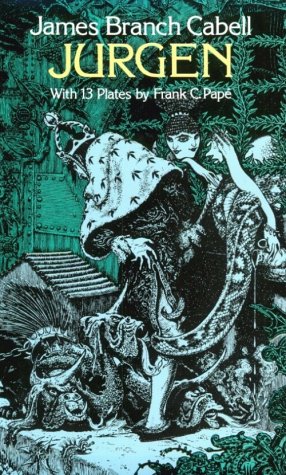
 Jurgen: A Comedy of Justice by James Branch Cabell
Jurgen: A Comedy of Justice by James Branch Cabell
Jurgen, an aging pawnbroker who considers himself a poet and a “monstrous clever fellow,” sets off to find his missing loquacious wife — not because he likes her, but rather because his family and friends say it’s the manly thing to do. While searching for Lisa, he enters a strange land and charms Mother Sereda into temporarily giving him back his youth and good looks. Then he uses his renewed vigor to lie and philander his way across a magical landscape, “dealing fairly” with all the women he meets, as he half-heartedly searches for his wife. Along the way he meets dozens of historical and mythical creatures and people (including Queen Guenevere, shown in the picture), first introducing himself as a duke, then promoting himself to prince, king, emperor, pope, and eventually, for a moment, even God.
Despite being a vain and hypocritical rogue, Jurgen has a sentimental heart (though he can’t seem to be faithful). But he is never content, even when he’s married to the most beautiful woman he’s ever seen, or even when he’s sitting on God’s throne. Thus, the story of Jurgen is about man’s quest for meaning, pleasure, and purpose. Jurgen is full of human insight and amusing social satire and, for a novel written in 1919, is oh so impolite. Much of the symbolism and metaphor is crude and puerile double entendre of the “big upright lance” and “remarkable powers of penetration” type.
Yet, James Branch Cabell (rhymes with “rabble”) writes in a sardonic voice which is beautiful and genuinely clever and funny, especially when Jurgen talks about women:
- I am looking for my wife, whom I suspect to have been carried off by a devil, poor fellow!
- Love’s sowing is more agreeable than love’s harvest.
- You talk and talk: no woman breathing equals you at mere volume and continuity of speech: but you say nothing that I have not heard seven hundred and eighty times if not oftener.
- “You have a wife, then!” says Jurgen, who was always interested in such matters. “Why, but to be sure! Either as a Christian or as a married man, I should have comprehended this was Satan’s due. And how do you get on with her?”
“Pretty well,” says Grandfather Satan: “but she does not understand me.”
“Et tu, Brute!” says Jurgen.
“And what does that mean?”- For the devils, he found, esteemed polygamy, and ranked it above mere skill at torturing the damned, through a literal interpretation of the saying that it is better to marry than to burn.
- [When Jurgen asks if it’s possible to get divorced in Hell, the devils say no because] “we trafficked in them for a while, but we found that all persons who obtained divorces through our industry promptly thanked Heaven…”
I also found it amusing that Jurgen, a pawnbroker with a paunch, backs up his arguments with fake scholarly citations and uses the study of mathematics to seduce intelligent women.
Even a well-educated reader will miss most of the allusions in Jurgen unless armed with a source such as David Rolfe’s Notes on Jurgen. These notes also point out references to Cabell’s previous novels about his fabricated world of Poictesme. Fortunately, understanding of all of these allusions isn’t required for enjoyment of the story, but they elicit chuckles when discovered and could be a source of much diversion for those who like to spend time studying these kinds of things.
Back in its day, Jurgen was deemed offensive by the New York Society for the Suppression of Vice, which tried to get it banned. This, of course, only increased Jurgen’s popularity. The Vice squad lost their case because, superficially, Jurgen seems harmless enough and, according to Cabell and his publisher, complaints about the recurrent references to Jurgen’s big staff, majestic scepter, upright lance, and amazing sword (which seem to meet a lot of veils, sheaths, clefts, and other dark places along the way) prove only that Cabell’s detractors have dirty minds.
Perhaps the real issue behind the outcry against Jurgen, however, is its disrespect of Christianity and, in particular, the Roman Catholic Church. For, when Jurgen is sent to Hell, he meets Grandfather Satan and learns that Hell is merely a construct developed by men who think so highly of themselves that they feel that their bad deeds were so influential that they cannot be forgotten and must be punished for eternity. The devils that Jurgen meets are hard-pressed to keep up with people’s demands for torture, lament that Hell’s population is increasing, and look for ways to stop the influx. When Jurgen gets bored of Hell, he talks his way into Heaven and finds that it’s just a figment of his grandmother’s imagination. His discussions with St. Peter cast an ill light on Catholic bishops and popes.
Jurgen is in the public domain and can be downloaded for free at Project Gutenberg. I downloaded the mobipocket version and stuck it right on my Kindle. Besides being free, Jurgen is an interesting and thoughtful novel which is worth reading not just for entertainment, but as part of the history of fantasy literature.




Excellent review of an old (yet surprisingly modern in tone and outlook) classic. Thanks Kat. I’d recommend “The Silver Stallion” and “Figures of Earth” as well for anyone who has read and enjoyed “Jurgen.”
Thanks! I will put those on my list.
Figures of Earth has been released on audio today. I’ll get it.